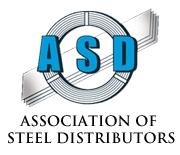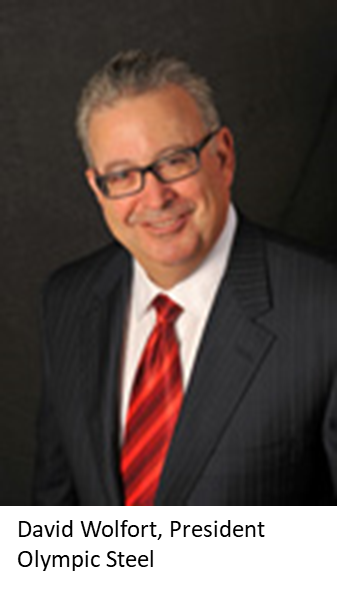Market Segment

September 16, 2017
Wolfort: Success Mandates Succession
Written by Sandy Williams
Long-term success requires strategic succession planning, said David Wolfort, president of Olympic Steel, who addressed members of the Association of Steel Distributors at their September regional meeting in Pittsburgh.
Olympic Steel was founded with $17,000 in 1954 by brothers Sol Siegal and Sam Sigel (yes, the spellings are correct) as a family enterprise focused on the warehousing and distribution of steel. The company at that time leased its building and equipment. During the years between 1954 and 1974, the company grew to $20 million. In 1974, Michael Siegal graduated and joined the company.

Wolfort was approached in 1983 by Mike Siegal to join Olympic, but did not sign on as general manager until 1984 when Mike bought the company from his father. Wolfort was the first professional non-family hire at Olympic Steel–a milestone for the company. With Mike Siegal at the helm, first generation was transitioned to second generation. From 1974 to 1984, Mike and his partner built the business from $20 million to $35 million. The generational transition was difficult, but smoothly done with a document and a long-term payout.
In 1986, Olympic made its first acquisition, buying Viking Steel and ending 1987 with $147 million in sales.
“When sales were under $100 million, banks were comfortable with us,” said Wolfort, “but over $100 million, banks required documentation and professionalism.” A small CPA firm and bookkeeper gave way to a chief financial officer and the enlargement of the organizational chart.
“If you are successful, you create careers and you create career paths for people,” said Wolfort. “If you are going to retain people, you need to offer a career path and you need to invest in their careers so they can succeed. And if they, in fact, expect to succeed, then they need to hire their successors and they need to train them.” The more years one intends to work, the greater the number of hires necessary.
In 1994, Olympic Steel went public after becoming a $313 million company and highly leveraged. “The window was open and we went through it,” said Wolfort.
At its 50th anniversary, the company had a $100 million profit year. In 2007, Olympic posted one billion dollars in sales for the first time.
Wolfort reiterated, “If we expect to be successful, we need to have successors, and if we expect to have successors, we have to home-grow some and attract some from the outside. That is where you get new ideas, from the outside.”
Andrew Greiff joined the company in 2009 as a strategic hire. “I dated Andy longer than I dated my wife to get him to join Olympic,” joked Wolfort, a courtship that lasted nearly eight years. Greiff became head of specialty metals, now operating at a $250 million run rate.
Greiff suggested the purchase of Integrity Stainless in 2010, recognizing that he wanted Andrew Markowitz as his successor. Markowitz succeeded Greiff earlier this year as president of specialty steel. Greiff is now executive vice president and chief operating officer.
The purchase of Chicago Tube and Iron in May 2011 was made because Olympic liked every aspect of CTI.
“When we look at acquisitions, don’t show me balance sheet, income statement and cash flow. There are other people to look at that,” said Wolfort. “The first thing I want to look at is an organizational chart. I want to be sure there are qualified people in those jobs to run that company if I am going to buy it.” Other potential acquisitions Olympic looked at were rejected because there was no succession plan.
“We told Don McNeeley [then president and CEO of CTI] we are only interested in buying Chicago Tube and Iron if you stay and nothing changes. The only thing we want is for you to report to Mike Siegal,” said Wolfort. Olympic then offered retention money for the top level at CTI to stay for four years. During that time a bench of internal and external hires was built to provide for succession with no disruption. “One word drives failure, and that is disruption,” said Wolfort.
As a company grows and strives to be successful, strategic hiring for a succession plan is crucial, Wolfort emphasized. Human capital is what makes a company grow. Training and retention is an important responsibility of upper management. High potential employees need to know they are being groomed. Olympic offers special projects, 100 percent tuition, coaching and mentoring to retain talented individuals and make sure they are ready to step up when the time comes.
Generational employment used to be 30 years; today it’s 40-45 years as people live and work longer. Companies need to grow organically–hire young people, nurture their careers, help them move up the ladder–as well making strategic hires of people with experience, Wolfort said.
Today, Olympic Steel operates 31 facilities and employs approximately 1,660 people. Its run rate is now about $1.5 billion in annual sales. By 2020, the company will have grown 57-fold since its founding in 1954.
Its organizational chart has grown from a handful of names to a deep roster of talent, ensuring that Olympic’s succession, and success, continue.
Written by Sandy Williams, Sandy@SteelMarketUpdate.com







